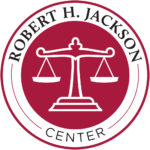Collections
-
Writings
- Law Review Articles about Robert H. Jackson
- Articles About Robert H. Jackson
- Books
- Early Life & Career (1892-1933)
- Treasury Department, Bureau of Internal Revenue (1934-1936)
- Assistant Attorney General, Tax Division (1936)
- Assistant Attorney General, Antitrust Division (1937)
- Solicitor General of the United States (1938-1940)
- Attorney General of the United States (1940-1941)
- Associate Justice of the Supreme Court (1941-1954)
- Nuremberg Prosecutor (1945-1946)
-
Photos
- Early Life & Career (1892-1934)
- Treasury Department, Bureau of Internal Revenue (1934-1936)
- Assistant Attorney General, Tax Division (1936)
- Assistant Attorney General, Antitrust Division (1937)
- Solicitor General of the United States (1938-1940)
- Attorney General of the United States (1940-1941)
- Associate Justice of the Supreme Court (1941-1954)
- Nuremberg Prosecutor (1945-1946)
-
Speeches
- Early Life & Career (1892-1934)
- Treasury Department, Bureau of Internal Revenue (1934-1936)
- Assistant Attorney General, Tax Division (1936)
- Assistant Attorney General, Antitrust Division (1937)
- Attorney General of the United States (1940-1941)
- Solicitor General of the United States (1938-1940)
- Associate Justice of the Supreme Court (1941-1954)
- Nuremberg Prosecutor (1945-1946)
- Supreme Court Opinions
Tribute to Mary Willard
On Wednesday afternoon, June 10, 1931, Jamestown attorney Robert Jackson was one of the speakers at the Jamestown Public Schools’ annual memorial exercises for former teachers and students. On this occasion, Jackson spoke in the Euclid Street School auditorium about his former high school teacher and important mentor Mary Rosina Willard, who had died earlier that year at age 74. Jackson’s speech, which was published in a local newspaper, also is contained in his papers in the Manuscript Division of the Library of Congress in Washington, D.C., Box 32.
Tribute to Milton J Fletcher
On Thursday evening, June 30, 1932, Jamestown attorney Robert Jackson attended the dinner 64th annual reunion of his 1910 alma mater, Jamestown High School. At this event, which was held at the Hotel Jamestown, Jackson spoke about Milton Joseph Fletcher, the former JHS Principal (1888-1919) and then Jamestown School Superintendent (1919-1932), who was retiring.
Address Celebrating WJTN Radio Joining the National Broadcasting Company Network
The improving condition of Jamestown’s industries and trade, which many of you may not see because you are too close to it, is a source of satisfaction.
Liberty Under Law
Words will hardly express my appreciation of this award. Its presentation evidences your fine generosity, whatever may be thought of the discrimination shown in your choice. You, and even I, must have reservations as to whether I deserve a place on the roll with the two extraordinary advocates on whom you have previously bestowed it. But I let no scruples stand in the way of eager and grateful acceptance.
Youth Faces “The New Order”
On Monday morning, February 23, 1942, Justice Robert H. Jackson delivered the following speech in Buffalo, New York, at the University of Buffalo’s (UB’s) 2nd annual midyear convocation (commencement). The ceremony was held in UB’s Edmund Hayes Hall before almost 1,000 persons, including sixty-five degree recipients. Justice Jackson gave this speech half way through his first year as a Supreme Court justice and just twelve weeks after Japan's devastating surprise attack on Pearl Harbor. He spoke to his Buffalo audience of Americans’ failure to grasp the drift of the world and the threat of Nazism, of the massive military struggle underway worldwide, and of the need for the U.S. to take the offensive in seeking to win a peace and a new world order based on reason, justice and personal freedom.
Nuremberg in Retrospect: Legal Answer to International Lawlessness
This is an authoritative account of the legal bases of the trials of the major Nazi war criminals before the International Military Tribunal at Nuremberg written by American Chief Prosecutor. Taken from an address delivered before the Canadian Bar Association meeting at Banff, Alberta, on September 1, Justice Jackson reviews in detail the legal foundations on which the trial rested and explains how the procedure used was determined.
Law and Lawgivers
The dedication, on Palm Sunday, of two clerestory windows located in the east wall of the North Transept completed the trilogy representing the three human enterprises to which the Bible gives major recognition: medicine, law, and education. The new windows, law and education, were designed and executed in the studio of Wilbur H. Bumham of Boston and were given by Mrs. Benjamin DeWitt Riegel of New York in memory of her father and her husband, respectively.
Training the Trial Lawyer: A Neglected Area of Legal Education
That a Justice of the United States Supreme Court should help Stanford Law School dedicate its new home is only to observe that comity which one educational institution owes to another. There is more similarity between the two than you may have thought.
Wartime Security and Liberty Under Law
To initiate this series of namesake lecturers is an honor and its association with the memory of James McConnack Mitchell imposes a responsibility. Here in Western New York, when I was admitted to its bar Mr. Mitchell already ranked high in its long list of eminent advocates, jurists and intellectual leaders.
Serving the Administration of Criminal Justice
I am always glad to appear before any function of the American Bar Association because long before I went to Washington I was active in the Association and was honored by it. I was one of the last chairmen of the conference of Bar Association Delegates which evolved into the House of Delegates, and the work of this Association has always been of interest to me. I think every man owes his best efforts to his profession.
